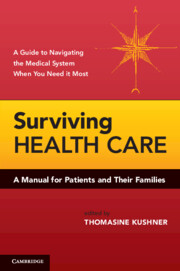Book contents
- Frontmatter
- Contents
- Contributors
- Preface
- 1 Letter to Patients
- 2 Becoming an Active Member of Your Health Care Team
- 3 Information That Will Help You with Advance Planning for Your Health Care
- 4 Responding to Medical Emergencies
- 5 What You Need to Know about Medical Errors
- 6 Being Informed When You Give Consent to Medical Care
- 7 Beware of Scorecards
- 8 Transplantation 101
- 9 When the Illness Is Psychiatric
- 10 On the Horizon
- 11 To Be or Not to Be – A Research Subject
- 12 Information That Will Help You Make Health Care Decisions for Adult Family Members
- 13 Caring for Individuals with Alzheimer's Disease
- 14 When the Patient Is a Child
- 15 Care of Elders
- 16 Being and Thinking
- 17 A Patient's Guide to Pain Management
- 18 The Hardest Decisions
- 19 What You Need to Know about Disasters
- 20 Making the Internet Work for You
- Appendix: Patient Individual Profile
- Index
- References
15 - Care of Elders
Published online by Cambridge University Press: 05 June 2012
- Frontmatter
- Contents
- Contributors
- Preface
- 1 Letter to Patients
- 2 Becoming an Active Member of Your Health Care Team
- 3 Information That Will Help You with Advance Planning for Your Health Care
- 4 Responding to Medical Emergencies
- 5 What You Need to Know about Medical Errors
- 6 Being Informed When You Give Consent to Medical Care
- 7 Beware of Scorecards
- 8 Transplantation 101
- 9 When the Illness Is Psychiatric
- 10 On the Horizon
- 11 To Be or Not to Be – A Research Subject
- 12 Information That Will Help You Make Health Care Decisions for Adult Family Members
- 13 Caring for Individuals with Alzheimer's Disease
- 14 When the Patient Is a Child
- 15 Care of Elders
- 16 Being and Thinking
- 17 A Patient's Guide to Pain Management
- 18 The Hardest Decisions
- 19 What You Need to Know about Disasters
- 20 Making the Internet Work for You
- Appendix: Patient Individual Profile
- Index
- References
Summary
This chapter discusses what you need to understand about the care of people who are “of a certain age.” What exactly that “certain age” is, we aren't saying (because we don't know). However, we will call someone who has reached such an age an elder, because we believe this is a more respectful term than old. We begin by saying a bit about what happens as we age and what's different about being an elder. We then discuss what we can do about the deleterious effects of aging on our bodies and how to maintain our health and vitality for as long as possible. Along the way, we address how to effectively interact with our doctors and the medical system.
In general, changes associated with aging are caused by repeated exposure to the stresses of life, which, in turn, lead to a progressive decrease in function of organs and the body as a whole. We take stress to mean the inability to cope with a perceived threat, real or imagined, to one's mental, physical, emotional, or spiritual self. One of the fundamental features of the body is its attempt to maintain a constant internal environment. This requires continual adjustments and interactions in and among the body's regulatory and repair mechanisms. Physiologists refer to this as the maintenance of homeostasis. As we age, for a variety of reasons, our ability to do this becomes impaired. This in turn leads to the burdens of dysfunction, disability, and disease that accumulate with aging.
Keywords
- Type
- Chapter
- Information
- Surviving Health CareA Manual for Patients and Their Families, pp. 206 - 221Publisher: Cambridge University PressPrint publication year: 2010

